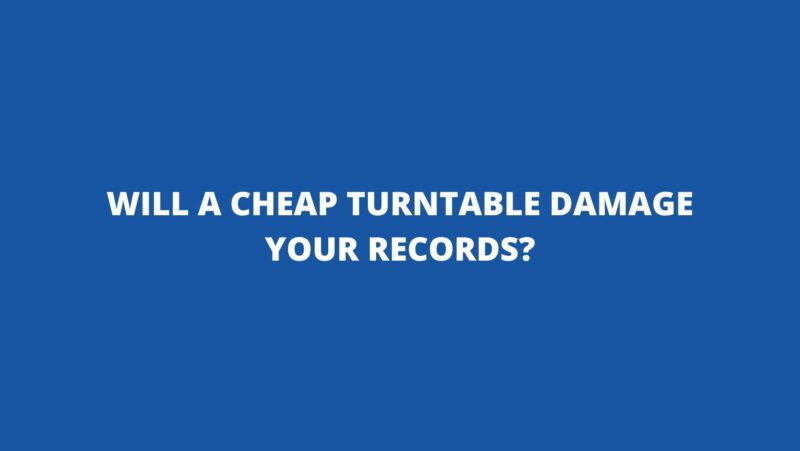The vinyl revival has reignited the passion for analog music, offering a nostalgic and immersive listening experience that modern digital formats can’t replicate. As more individuals embrace vinyl, the question of equipment quality becomes paramount, especially when it comes to the turntable – the heart of the vinyl playback system. A prevailing concern among enthusiasts is whether a cheap turntable can potentially damage their cherished vinyl records. This comprehensive article delves into the intricacies of this topic, examining the potential risks posed by budget turntables and shedding light on the measures that can safeguard record longevity.
The Turntable-Record Dynamic: A Delicate Interplay
Understanding the relationship between turntables and records is essential to grasp the potential impact of a cheap turntable on vinyl longevity. A turntable’s primary function is to track the grooves of a vinyl record accurately, converting the analog information into an audible musical experience. This process involves delicate physical contact between the stylus and the grooves, making the quality of the turntable components a crucial factor in preserving both the records and the overall listening experience.
Potential Risks of Cheap Turntables
- Inferior Build and Components: Cheap turntables often feature subpar build quality and low-grade components, such as lightweight platters, poorly calibrated tonearms, and substandard bearings. These deficiencies can lead to uneven tracking and increased wear on the grooves, potentially compromising the sound quality and longevity of your records.
- Incorrect Tracking Force: Tracking force – the downward pressure exerted by the stylus on the grooves – is a critical parameter in vinyl playback. Cheap turntables might lack proper calibration mechanisms, resulting in incorrect tracking force. Excessive tracking force can gouge and wear out the grooves, while insufficient force can cause distortion and poor sound quality.
- Inadequate Isolation: Turntables require proper isolation from vibrations to prevent feedback and unwanted resonances. Cheap turntables often lack effective isolation mechanisms, making them susceptible to external vibrations that can introduce unwanted noise and affect playback quality.
- Stylus and Cartridge Quality: The stylus (needle) and cartridge are integral to extracting audio information from the grooves. Cheap turntables might come with low-quality styluses and cartridges that not only compromise sound quality but can also cause unnecessary wear on the records.
- Lack of Speed Consistency: Maintaining consistent rotational speed (RPM) is crucial for accurate playback. Cheap turntables might exhibit speed fluctuations that affect pitch accuracy and can potentially cause record damage due to inconsistent stylus movement.
Mitigating Risks and Protecting Records
- Invest in Entry-Level Quality: If you’re on a budget, consider investing in an entry-level turntable from reputable manufacturers that prioritize build quality and performance. These turntables often strike a balance between affordability and the essential features needed to protect your records.
- Proper Calibration: Regardless of the turntable’s price, proper calibration is key. Ensure that tracking force, anti-skate, and cartridge alignment are correctly set according to the manufacturer’s guidelines. Use a stylus force gauge for accurate measurement.
- Upgradeable Components: Look for turntables with components that can be upgraded over time. This allows you to enhance the turntable’s performance without compromising the records’ integrity.
- Isolation Solutions: Proper turntable isolation is crucial. Invest in a stable surface or use vibration isolation platforms to minimize the impact of external vibrations.
- Regular Maintenance: Maintain your turntable and records by routinely cleaning them. Dust, debris, and static can exacerbate wear and distortion.
Conclusion
The choice of turntable is a pivotal decision for vinyl enthusiasts, as it directly influences the quality and longevity of both the playback system and the records. While cheap turntables carry the risk of compromising record integrity, informed decisions and strategic choices can mitigate these risks. Investing in an entry-level turntable with respectable build quality and proper calibration mechanisms is a step toward safeguarding your vinyl collection. By understanding the nuances of the turntable-record dynamic and taking proactive measures, you can embrace the analog realm with confidence, preserving the sonic magic and tactile experience that makes vinyl a cherished medium.


